The Google Nexus 9 Review
by Joshua Ho & Ryan Smith on February 4, 2015 8:00 AM EST- Posted in
- Tablets
- HTC
- Project Denver
- Android
- Mobile
- NVIDIA
- Nexus 9
- Lollipop
- Android 5.0
GPU Performance
While Denver is new, the Kepler GPU in the Tegra K1 is mostly a known quantity by now. In the Nexus 9, the GPU is still a single SMX clocked to 852 MHz. In order to verify performance, we turn to our standard test suite. For the most part, our GPU-bound tests are meant to represent gaming performance although tests like 3DMark can have CPU-bound aspects while GFXBench tends towards being a pure GPU test.
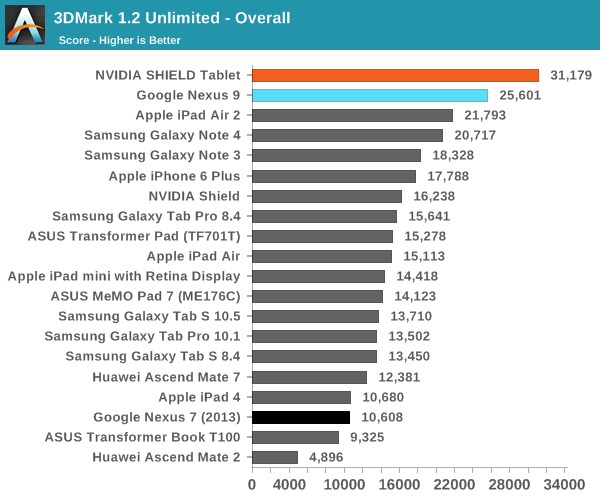
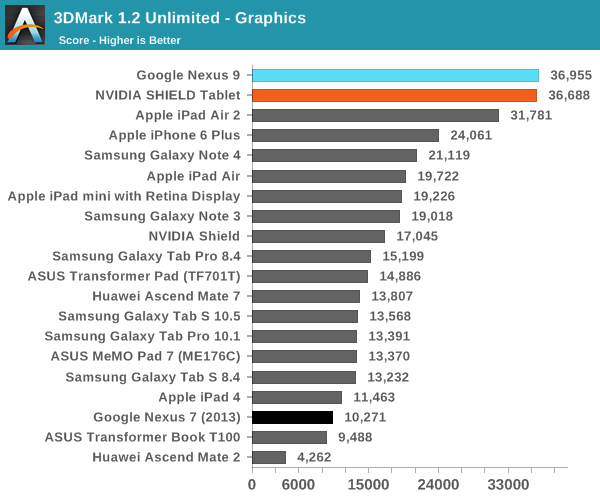
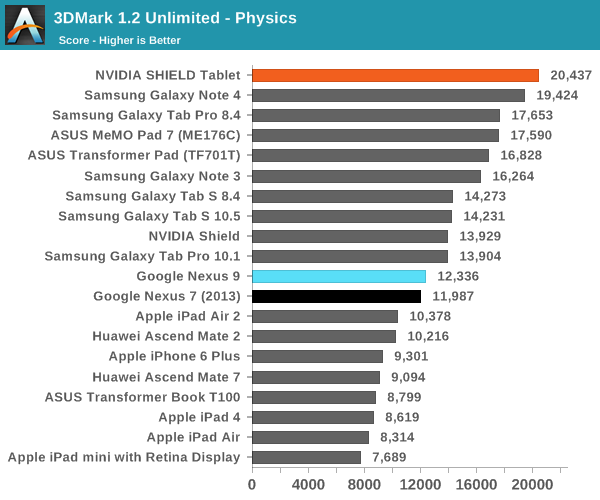
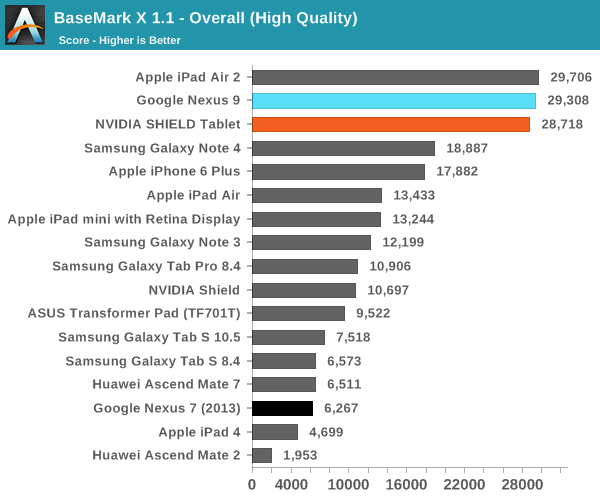
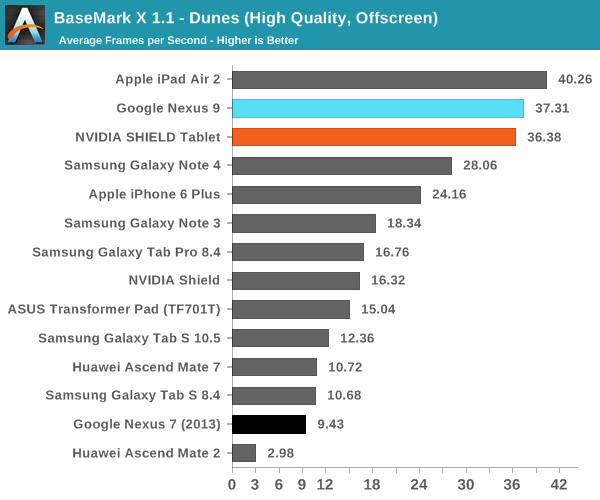
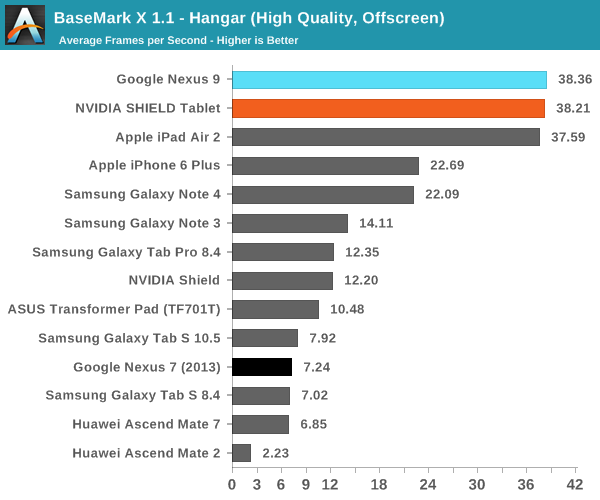
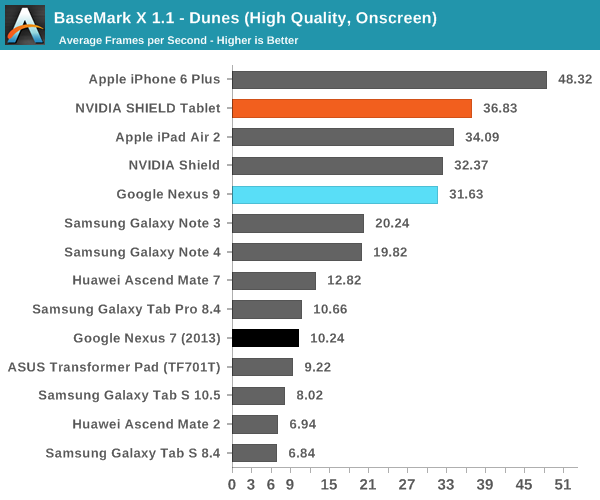
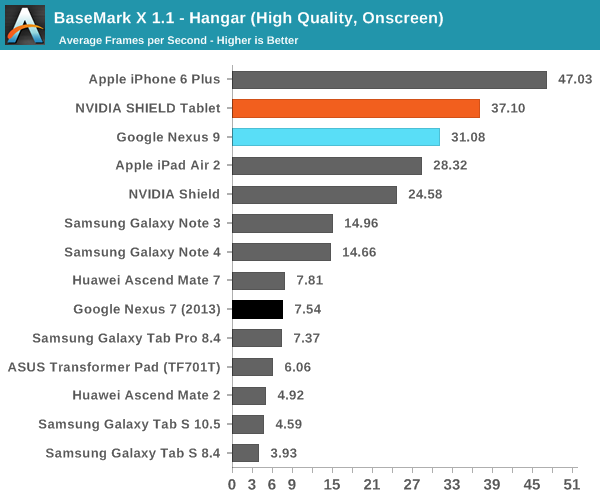
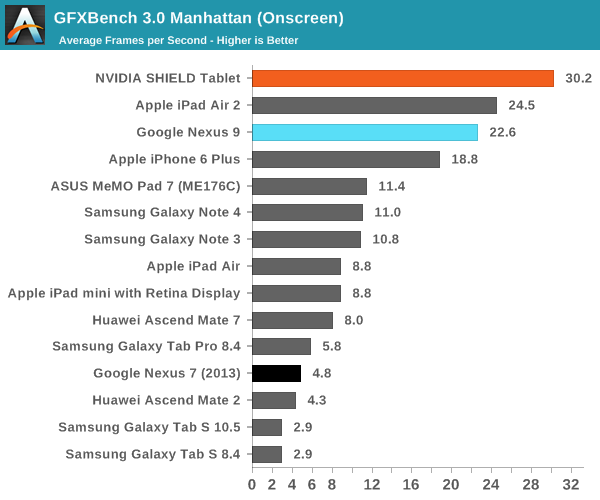
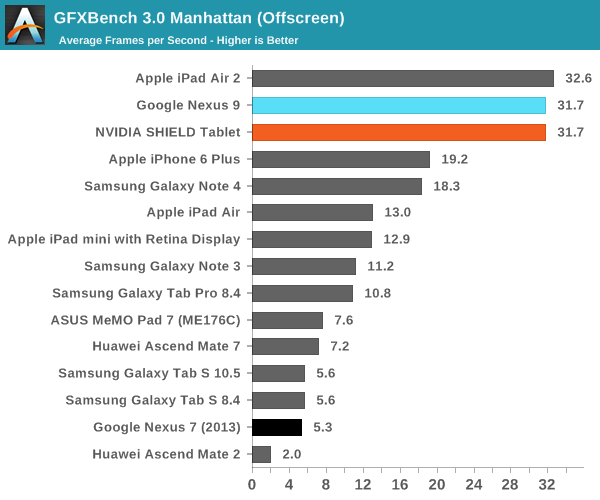
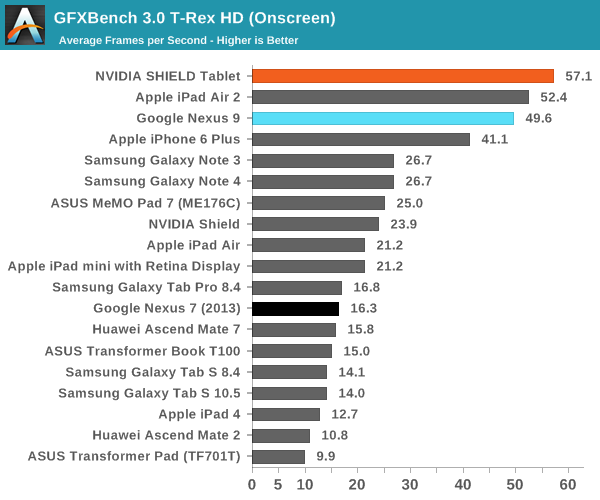
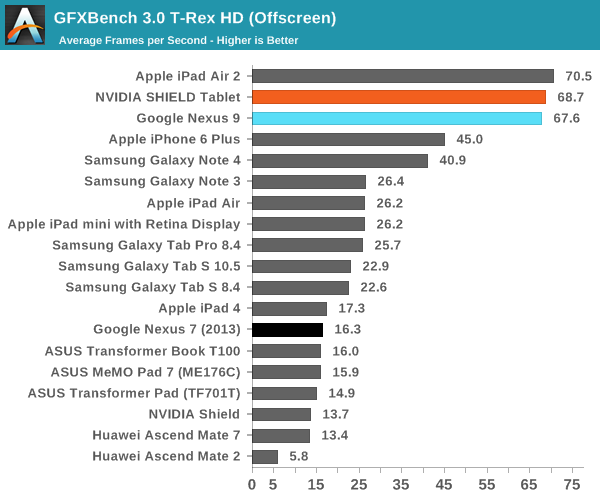
The Nexus 9's GPU has effectively identical performance to what we saw in the SHIELD Tablet, which means that the Nexus 9 should be able to support a broad range of games without performance issues. There is a bit of a noticeable performance delta when comparing on-screen performance, but this is simply due to the higher resolution of the Nexus 9's display. The one notable exception is the 3DMark physics test, which seems to scale with core count quite well, and that causes Denver to fall slightly short of the quad A15 configuration.
NAND Performance
While storage performance can often be secondary to a smooth user experience, poor storage performance is extremely painful. This is similar to RAM, where the difference between 2 and 3 GB is generally academic, while the difference between 512MB and 1 GB is enormous. While there have been some issues with Androbench with the move to Android 5.0, it seems that the timer issues have since been resolved, so it's possible to resume using the results from Androbench to get a rough idea of NAND performance.
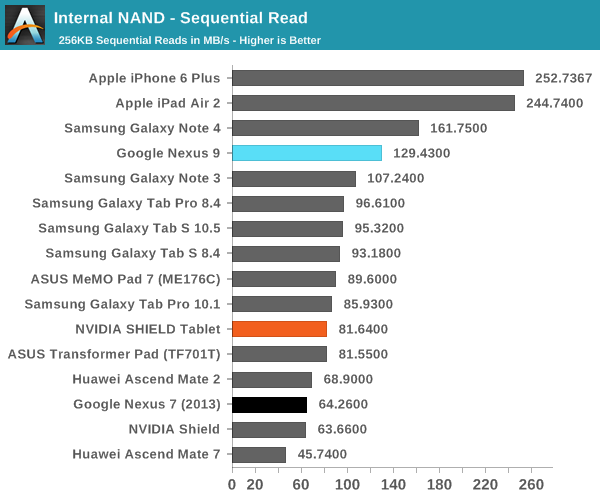
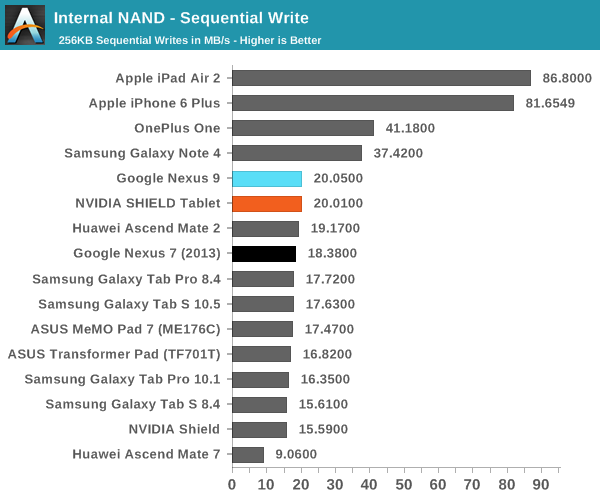
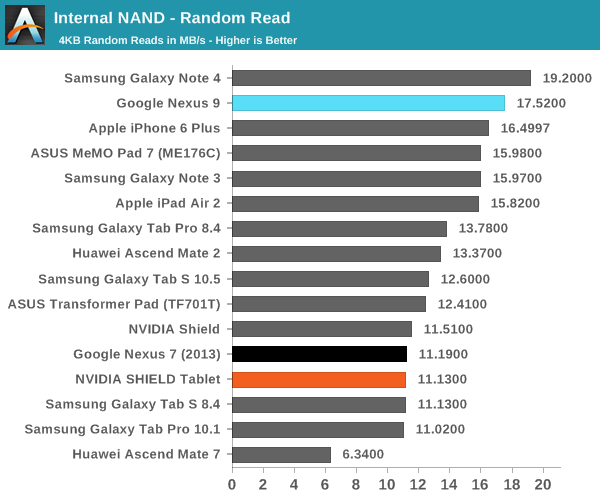
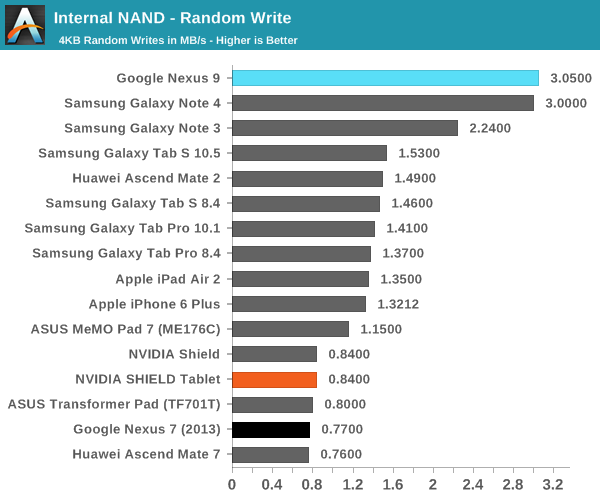
Here the Nexus 9 doesn't suffer nearly as much from full disk encryption that is forcibly enabled on the device; performance is noticeably higher than what we see in the Nexus 6. This seems to lend some credence to the theory that CPUs with ARM v8 ISA would be better suited to handling the need to encrypt and decrypt storage in real time. I tested the Nexus 9 with a custom kernel without full disk encryption to see how Androbench scores might change, but this didn't have a noticeable impact which seems to back this theory, although I'm still not confident that FDE is a good idea to enforce across all new devices.
The NAND itself, a Samsung eMMC package designated by the name BWBC3R, seems to be quite performant outside of pure sequential access, which seems to suggest that HTC hasn't skimped out in this area at all, and the use of F2FS is responsible for some of the best random I/O scores in any mobile devices we've tested thus far.










169 Comments
View All Comments
ABR - Thursday, February 5, 2015 - link
I don't know if it would change this conclusion, but load-every-15-seconds is still only testing "screenager" behavior. For example while I'm reading this comments page it's a lot longer than 15 seconds. More like 30 seconds, scroll, 30 seconds, scroll, 5-10 minutes load another. Reading e-books is another low-intensity usage. Not saying that gaming and other continuous usage patterns aren't out there, but a lot of what people say they use tablets for is lower intensity.lucam - Thursday, February 5, 2015 - link
Upspin, send your resume to Anand and write next time your article. Looking fwd to reading your pearl of wisdom...Affectionate-Bed-980 - Wednesday, February 4, 2015 - link
You guys really need to stop using that gray/black surface for the background to show off your black devices. It really makes it hard to see the details.gijames1225 - Wednesday, February 4, 2015 - link
It's a shame that NVidia couldn't get Denver out on a smaller process at launch. They're giving the A8 a run for it's money, but the 28nm process is killer at this point.WereCatf - Wednesday, February 4, 2015 - link
"it seems to be clear that an all-metal unibody design would’ve greatly improved the design of the Nexus 9 and justified its positioning better."I don't quite agree. This article mentions several times the author's wish for full-body aluminum design, but as someone who already has a tablet with a nearly full aluminum body I do have to point out that it tends to be quite slippery in one's hands; you need a much tighter grip just to hold it without it slipping and this makes it tiring to hold in the long run. A tablet with a sort of rubbery, non-slip back won't look as pretty, but it will certainly be much more comfortable and I definitely would choose practicality over looks.
danbob999 - Wednesday, February 4, 2015 - link
Also metal blocks wireless signal. Asus Transformer Prime has abysmal wifi and GPS reception because of that.There is no rational advantage to metal cases. Only looks, which is debatable.
WereCatf - Wednesday, February 4, 2015 - link
Aye, my tablet had that issue. Luckily it's easy to open up and replace the antenna with a stronger one, something that helps, but not all tablets are that easy to open or have a replaceable antenna.Impulses - Wednesday, February 4, 2015 - link
Metal would also make it heavier... Plastic doesn't have to mean back flex, it's just a design/QC issue they didn't address. My OG TF had a textured plastic back that was pretty solid, several years ago. It still creaked a little but it was mostly because of the mating of the back to the metal frame, no flex tho.olivaw - Wednesday, February 4, 2015 - link
I wonder if nVidia is "crazy enough" to develop a runtime that would JIT from android bytecode directly to denver. As it is, there are two layers of compilation going on, if ART could by swapped by an nVidia runtime things could get really interesting!joe0185 - Wednesday, February 4, 2015 - link
The browser tests are pretty worthless as it is but they are made even more worthless by the omission of version information. If AnandTech is going to include Javascript benchmarks they should at least include the browser version. What version of Chrome are you running on each device? There have been pretty dramatic improvements in Chrome on Android over the past year.